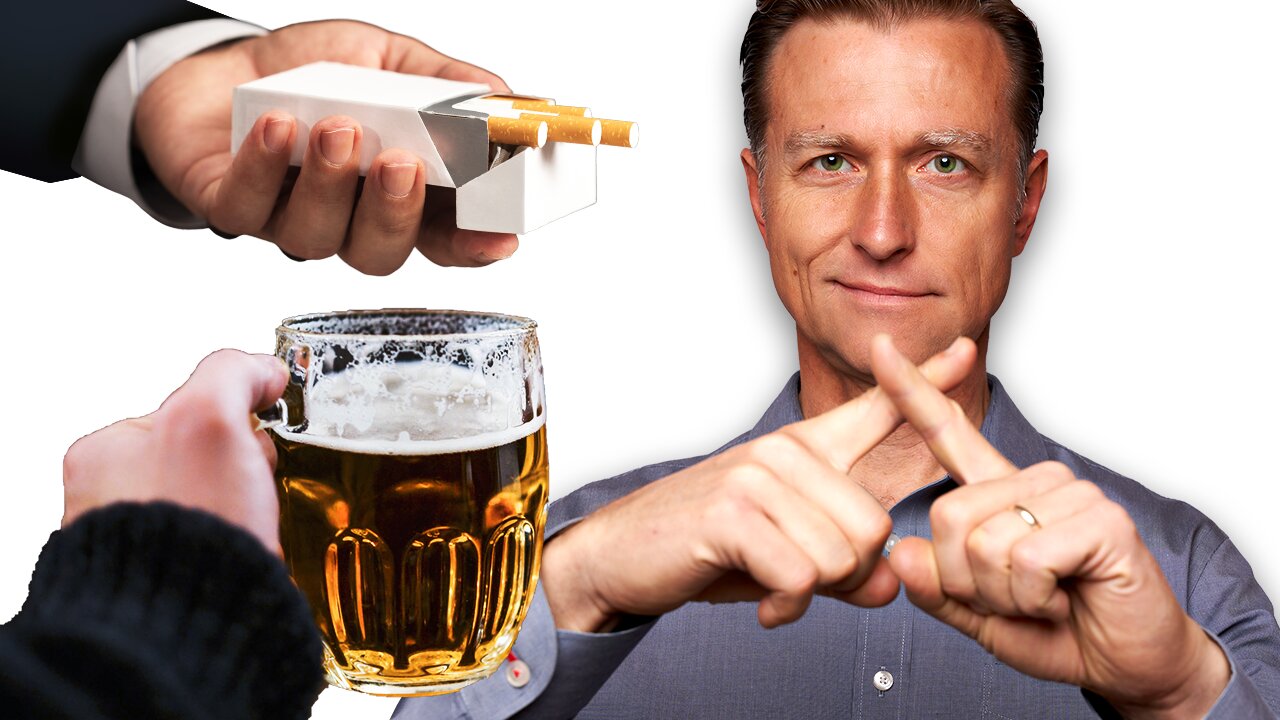Premium Only Content

How to Stop Addictions (Nicotine, Alcohol, & Drugs)
Watch this video to learn effective natural strategies for transitioning out of nicotine, alcohol, and drug addictions.
DATA:
https://www.jci.org/articles/view/27160
0:00 Introduction: How to transition off of nicotine, alcohol, and drugs
0:38 What is NAD?
0:57 Benefits of niacin
1:38 What to do about NAD deficiency
2:12 Addiction’s effect on NAD and energy
2:32 Symptoms of NAD deficiency
3:57 Is it advisable to supplement with NAD or NADH?
4:12 Other ways to increase NAD naturally
Addiction to substances like nicotine, alcohol, and drugs can be incredibly difficult to overcome. These addictions harm our mental and physical health and deplete essential nutrients in the body, particularly NAD.
NAD is a crucial coenzyme involved in over 500 different chemical reactions in the body. It plays a vital role in energy production, DNA repair, and maintaining proper cellular functioning. However, addiction to substances like nicotine, alcohol, and drugs can significantly deplete NAD levels in the body.
Symptoms of NAD deficiency include fatigue, muscle soreness, weight gain, difficulty sleeping and concentrating, brain fog, and decreased stamina. These symptoms can make it even harder for someone to overcome an addiction.
To combat NAD deficiency, consider taking vitamin B3, also known as niacin. Niacin helps increase NAD levels in the body, improving energy, helping to reduce withdrawal symptoms and cravings, and aiding in addiction recovery.
Some people may experience a flushing response on their skin when taking niacin, which can be uncomfortable. In this case, no-flush niacin can be used instead.
In addition to supplementing with niacin, there are other ways to increase NAD levels in the body, such as intermittent fasting, following a healthy ketogenic diet, and regular exercise.
These lifestyle changes can support addiction recovery and overall well-being. In some cases, clinics offer IV therapy for NAD to help with addiction recovery. However, this can be expensive and not accessible to everyone.
Dr. Eric Berg DC Bio:
Dr. Berg, age 59, is a chiropractor who specializes in Healthy Ketosis & Intermittent Fasting. He is the author of the best-selling book The Healthy Keto Plan, and is the Director of Dr. Berg Nutritionals. He no longer practices, but focuses on health education through social media.
Follow Me On Social Media:
Facebook: https://bit.ly/FB-DrBerg
Instagram: https://bit.ly/IG-DrBerg
Listen to my Podcast: https://bit.ly/drberg-podcast
TikTok: https://bit.ly/TikTok-DrBerg
Disclaimer:
Dr. Eric Berg received his Doctor of Chiropractic degree from Palmer College of Chiropractic in 1988. His use of “doctor” or “Dr.” in relation to himself solely refers to that degree. Dr. Berg is a licensed chiropractor in Virginia, California, and Louisiana, but he no longer practices chiropractic in any state and does not see patients, so he can focus on educating people as a full-time activity, yet he maintains an active license. This video is for general informational purposes only. It should not be used to self-diagnose, and it is not a substitute for a medical exam, cure, treatment, diagnosis, prescription, or recommendation. It does not create a doctor-patient relationship between Dr. Berg and you. You should not make any change in your health regimen or diet before first consulting a physician and obtaining a medical exam, diagnosis, and recommendation. Always seek the advice of a physician or other qualified health provider with any questions you may have regarding a medical condition.
#keto #ketodiet #weightloss #ketolifestyle
Thanks for watching! Overcoming addictions can be a challenging journey, but supporting your body's natural production of NAD may greatly help improve the process. I'll see you in the next video!
-
 18:57
18:57
Dr. Eric Berg
2 days agoHow to Never Get Cancer (30 Scientifically Proven Tips)
5.85K26 -
 5:59:05
5:59:05
SpartakusLIVE
9 hours ago#1 MACHINE Never Stops The GRIND || LAST Stream UNTIL Friday
142K2 -
 28:36
28:36
Afshin Rattansi's Going Underground
1 day agoDoug Bandow: ENORMOUS DAMAGE Done to US’ Reputation Over Gaza, Trump ‘Easily Manipulated’ by Israel
25.7K29 -
 2:45:13
2:45:13
Barry Cunningham
15 hours agoCBS CAUGHT AGAIN! CHICAGO A MESS! LISA COOK IS COOKED AND MORE LABOR DAY NEWS!
108K50 -
 6:39:17
6:39:17
StevieTLIVE
9 hours agoMASSIVE Warzone Wins on Labor Day w/ Spartakus
30.6K1 -
 10:46:42
10:46:42
Rallied
16 hours ago $17.67 earnedWarzone Challenges w/ Doc & Bob
200K4 -
 3:26:25
3:26:25
Joe Donuts Live
9 hours ago🟢 Lost in Space with My Clones: The Alters Adventure Begins
37.1K5 -
 7:20:22
7:20:22
Dr Disrespect
17 hours ago🔴LIVE - DR DISRESPECT - TRIPLE THREAT CHALLENGE - WINNING AT EVERYTHING
224K12 -
 2:35:33
2:35:33
Chrono
10 hours agoBirthday-eve Stream | Helldivers II
31.8K1 -
 54:40
54:40
BonginoReport
1 day agoLABOR DAY SPECIAL! The Best of Nightly Scroll - Nightly Scroll w/ Hayley Caronia (Ep.124)
138K15